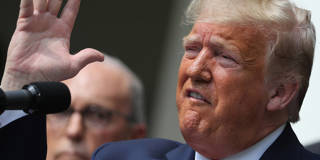Longstanding and bipartisan pretensions of American exceptionalism, rising domestic concerns, and a lack of policy clarity suggest that, even if Donald Trump is voted out in November, the US-led cooperation the world needs will not soon emerge. But another four years of Trump would almost certainly make matters worse.
HONG KONG – Former US National Security Adviser John Bolton’s new book The Room Where It Happened bills itself as “the most comprehensive and substantial account” of President Donald Trump’s administration. And, indeed, it has quickly become a critical resource for those seeking to understand Trump. But, despite Bolton’s juicy revelations about Trump’s conduct of foreign policy (which his administration tried in vain to keep off bookshelves), the book does little to answer the fundamental question facing the US: Is its current foreign-policy muddle Trump’s fault, or the result of something deeper and more structural?
There is no doubt that Trump’s leadership is problematic, even dangerous. A longtime Washington insider, Bolton assumed that, as national security adviser, he would be responsible for ensuring that the president “understood what options were open to him for any given decision,” and that the decision would then be “carried out by the pertinent bureaucracies.”
But Trump was not interested in an orderly calculation of policy priorities and trade-offs. Nor was he much interested in policy implementation. Managing the different agendas, interests, and egos of America’s complex bureaucratic machinery – including the State Department, the Pentagon, the Treasury, and intelligence agencies – is barely on his radar.

HONG KONG – Former US National Security Adviser John Bolton’s new book The Room Where It Happened bills itself as “the most comprehensive and substantial account” of President Donald Trump’s administration. And, indeed, it has quickly become a critical resource for those seeking to understand Trump. But, despite Bolton’s juicy revelations about Trump’s conduct of foreign policy (which his administration tried in vain to keep off bookshelves), the book does little to answer the fundamental question facing the US: Is its current foreign-policy muddle Trump’s fault, or the result of something deeper and more structural?
There is no doubt that Trump’s leadership is problematic, even dangerous. A longtime Washington insider, Bolton assumed that, as national security adviser, he would be responsible for ensuring that the president “understood what options were open to him for any given decision,” and that the decision would then be “carried out by the pertinent bureaucracies.”
But Trump was not interested in an orderly calculation of policy priorities and trade-offs. Nor was he much interested in policy implementation. Managing the different agendas, interests, and egos of America’s complex bureaucratic machinery – including the State Department, the Pentagon, the Treasury, and intelligence agencies – is barely on his radar.